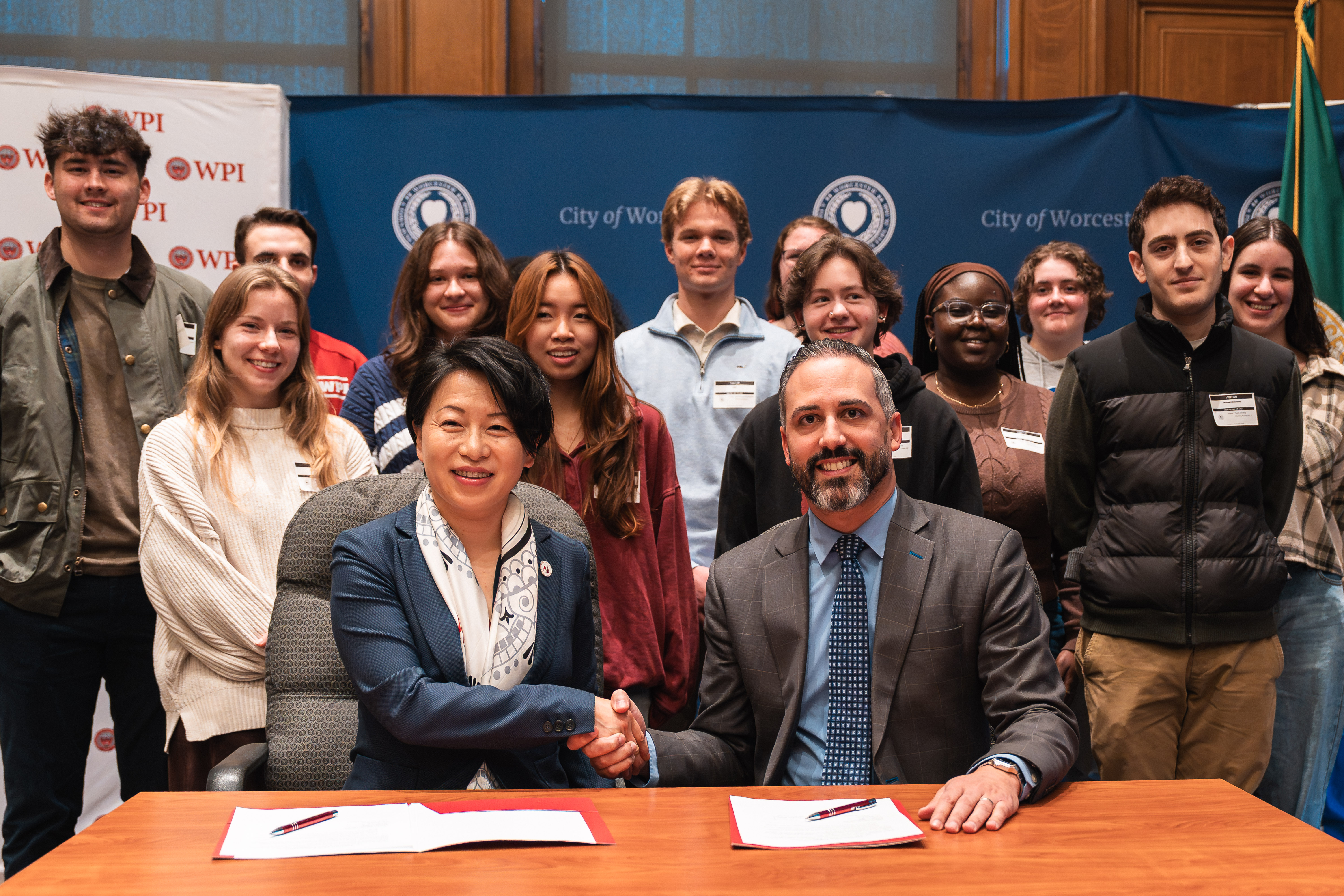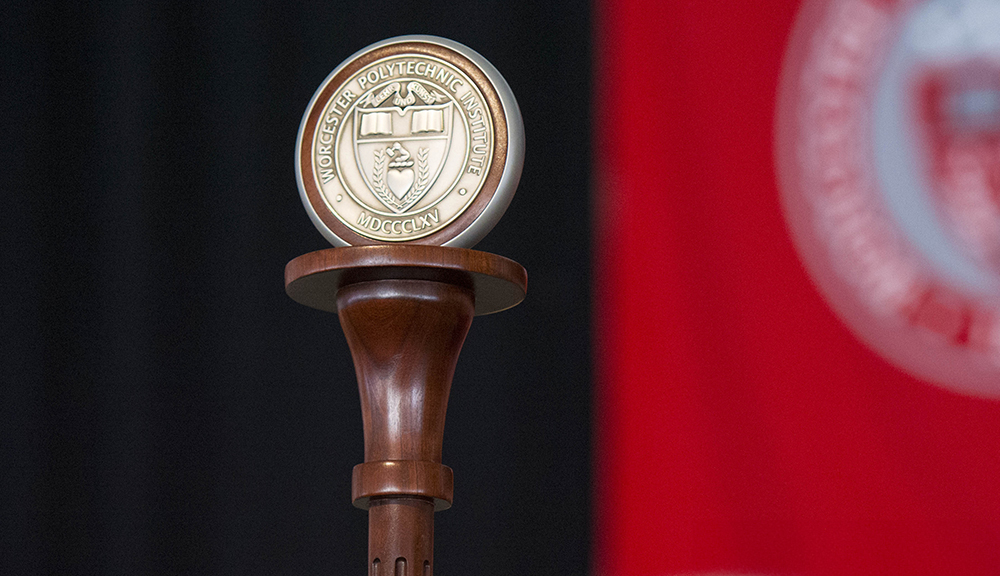Worcester, Mass. - Colleges are significant contributors to the economic prosperity of the cities they call home, according to the national experts on urban development who spoke at a conference held Oct. 5 at Worcester Polytechnic Institute (WPI).
Local case studies such as WPI’s under-construction Gateway Park project on Prescott Street in Worcester, and the Worcester expansion of the Massachusetts College of Pharmacy and Health Sciences (MCPHS) were showcased before an approximately 100-member audience that included developers, business representatives, state and city government officials, college administrators, faculty and students.
"No more can we consider universities enclaves," said Perry. "They are fully vested urban institutions. Universities are not only important to the urban environment. [They are] central to the technology pipeline, and to enhancing research."
Some of the examples Perry and Wiewel cited to show how colleges and universities can help reshape their host communities were Columbia University, Northeastern University, University of Colorado at Denver, and the University of Illinois at Chicago. Columbia University, Perry noted, is the third largest landowner in New York City.
"Universities have to be good developers if they want to be good landowners," he said. "A campus can’t be just a campus anymore; it has to be much more. The design of a campus should weave into the retail area of a city, like Tacoma in Washington. The campus master plan becomes part of the city’s overall master plan."
The process of forming a partnership with the community includes: off-campus real estate development, which needs leadership; strong internal structure, entailing small teams for partnerships and expertise and decision-making ability; partners like private developers; community relations; and a good relationship with city government.
"There should be a staffer in city government who deals full-time with higher education," Wiewel emphasized, adding that financing was a key factor in the process.
Two local case studies were featured at the forum: Gateway Park and the MCPHS Worcester campus. Armand W. Carriere, executive director of the Worcester UniverCity Partnership, lauded WPI President Dennis D. Berkey for his leadership in the development of Gateway Park, an 11-acre life sciences-based, mixed-use campus on a former industrial site that WPI is developing with the Worcester Business Development Corporation (WBDC). "Dr. Berkey is a wonderful asset to this community," Carriere said. "He is truly a champion of this work."
"We have wonderful teamwork with our mayor and city manager," Berkey said. "We’re very confident that 10, 20, 30 years from now, the economy of Worcester will thrive, but we’re very impatient. It’s a time of high momentum in Worcester."
A panel consisting of President Berkey, D’Anne Hurd, WPI’s vice president for business development at Gateway Park and general counsel; Craig Blais, vice president of WBDC; Kevin O’Sullivan, president of Massachusetts Biomedical Initiatives; and State Sen. Edward M. Augustus Jr. focused on "Gateway Park at WPI: A Model for Public-Private Investment."
"This isn’t just about developing WPI," President Berkey explained. "It’s about developing Worcester. What’s good for Worcester is good for WPI and the other colleges in the area.
"We’re committed to helping promote a new neighborhood in Worcester, Gateway Park," Berkey continued, praising U.S. Sen. Edward M. Kennedy, D-Mass. and U.S. Congressman James McGovern, D-Worcester, for their assistance with launching Gateway Park and securing federal funding for the project.
Said Blais: "We always say, ’No WPI, no Gateway Park.’ WPI has played a tremendous part in revitalizing this part of the city. Clearly, WPI is the pioneer here."
Charles F. Monhan Jr., a Worcester native and president of the MCPHS, discussed the college’s investment in the city. He noted that with 3,400 students enrolled, the college’s Boston campus was "maxed out," thus spearheading the need for expansion.
"Worcester is rich in its biotech, hospitals and universities," Monahan said, noting that the new branch is accredited to graduate 135 pharmacists in the spring. "It was the perfect place to be, so we bought two buildings, one for $300,000 and one for $800,000, across from St. Vincent’s Hospital."
Monahan cited a "great relationship with Worcester. When you have the community behind you, it really makes a difference," he said. "The expansion has brought about a lot of alumni support, too."
The college’s first two buildings are on Foster Street in Worcester. The Living & Learning Center, at 25 Foster St., has nine floors and covers 90,000 square feet. Both buildings were completed in nine months, which, according to Monahan, is "unprecedented."
The school recently bought an additional four buildings - an entire city block -- with a total investment of $50 million. "So, we’re here for the long haul," said Monahan, who works in Worcester one day a week. "It’s been a very good financial model, and the school is growing because of that.
"Worcester is so user-friendly," he added. "It’s who you are, and what you bring to the community that matters."
This was the third in a series of conferences presented by the Worcester UniverCity Partnership and the New England Resource Center for Higher Education. The first, in February at Clark University, focused on the role colleges can play in community economic development; the second, in April, at the College of the Holy Cross, featured the topic of leveraging financial resources for university and community partnerships.
In photo, Left to right: Armand Carriere, executive director, Worcester UniverCity Partnership; D’Anne Hurd, WPI vice president for business development at Gateway Park; Kevin O’Sullivan, president, Mass. Biomedical Initiatives; Craig Blais, vice president, Worcester Business Development Corporation; Keynote Speaker David C. Perry, director, Great Cities Institute, University of Illinois at Chicago; state Sen. Edward M. Augustus Jr.; Keynote Speaker Wim Wiewel, provost and senior vice president for academic affairs, University of Baltimore; John Saltmarsh, director, NERCHE; and Dennis D. Berkey, president, WPI.
About Gateway Park
Gateway Park is an 11-acre, master-planned redevelopment of a former Worcester brownfield. The project is being developed by Gateway Park, LLC, a public-private partnership between WPI and the Worcester Business Development Corporation. At build out, the development will feature between 500,000 and one million square feet of mixed-use space. Gateway Park’s first building, the WPI Life Sciences and Bioengineering Center, is under construction, with completion scheduled for spring 2007. It will house WPI’s life sciences-related graduate research programs in biology and biotechnology, biomedical engineering, chemical engineering, and chemistry and Biochemistry, the WPI Bioengineering Institute, an incubator facility being built by Massachusetts Biomedical Initiatives, among other tenants. The Gateway Park master plan calls for three additional pad-ready sites that will support buildings of 80,000, 100,000, and 160,000 square feet. An additional 1.7 acre parcel is available for housing development.
About the UniverCity Partnership
The UniverCity Partnership, established just over a year ago, is a non-profit coalition of public and private sector organizations working with the colleges of Worcester. These organizations include the Worcester Regional Chamber of Commerce, the Worcester Business Development Corporation, the Colleges of Worcester Consortium, and the City of Worcester. The Partnership was created to engage Worcester’s institutions of higher education in promoting economic development and community revitalization.


